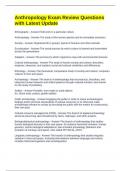Anthropology Exam Review Questions
with Latest Update
Ethnography - Answer-Field work in a particular culture
Anthropology - Answer-The study of the human species and its immediate ancestors
Society - Answer-Organized life in groups; typical of humans and other animals
Enculturation - Answer-The social process by which culture is learned and transmitted
across the generations
Adaption - Answer-The process by which organisms cope with environmental stresses
Cultural anthropology - Answer-The study of human society and culture; describes,
analyzes, interprets, and explains social and cultural similarities and differences
Ethnology - Answer-The theoretical, comparative study of society and culture; compares
cultures in time and space
Archaeology - Answer-The branch of anthropology that reconstructs, describes, and
interprets human behavior and criltiral patterns through material remains; best known
for the study of prehistory
Artifact - Answer-Portable, man-made or used objects
Ex: Stone tools, pottery, golden tablets
Public archaeology - Answer-Engaging the public in order to share archaeological
findings and/or promote stewardship of cultural resources or to otherwise make
archaeology relevant to society by providing the public with the means for constructing
their own past
Cultural resource management (CRM) - Answer-The branch of applied archaeology
aimed at preserving sites threatened by dams, highways, and other projects
Biological/physical anthropology - Answer-The branch of anthropology that studies
human biological diversity in time and space- for instance hominoid evolution, human
genetics, human biological adaptations; also includes primatology (behavior and
evolution of monkeys and apes). Also called PHYSICAL ANTH
Linguistic anthropology - Answer-The branch of anthropology that studies linguistic
variation in time and space, including interrelations between language and culture;
includes historical linguistics and sociolinguistics
,Sociolinguistics - Answer-Study of relationships between social and linguistic variation;
study of language in its social context
Ethnomusicology - Answer-Branch of linguistics: Studies of forms of music worldwide
Applied anthropology - Answer-The application of anthropological data, perspectives,
theory, and methods to identify, assess, and solve contemporary social problems
Symbols - Answer-Something, verbal or non-verbal, that arbitrarily and by convention
stands for something else, with which it has no necessary or natural connection
Culture - Answer--Adaptive, extrasomatic, symbolic information and beliefs shared
among individuals through social learning
-Encompasses everyday life and psychology of humans
-Necessary for human survival
-Signals are used to denote group membership and status
Ideal culture - Answer-What people SAY they do
Real culture - Answer-What people ACTUALLY do (Ex: people downplay alcohol, sex,
sin)
Individualism - Answer-A social theory favoring freedom of action for individuals over
collective or state control?
Core values - Answer-Key, basic, or central values that integrate a culture and help
distinguish it from others
Adaptive - Answer-Culture is adaptive to biological and environmental needs
Maladaptive - Answer-Maladaptive traits do exist in culture
Ex: over-consumption, ideals of beauty, gender roles, family planning
Not just harmful to group but also individual
Universal features - Answer-Found in EVERY culture
(Ex: Some form of marriage)
Generalities - Answer-Culture pattern or trait that exists in some but not all societies
(Ex: Nuclear family, patriarchal system)
Particularities - Answer-Distinctive or unique culture trait, pattern, or integration
(Ex: Aggie War Hymn)
Diffusion - Answer-Borrowing between cultures either directly or through intermediaries
, Agency - Answer-The capacity of individuals to act independently and to make their own
free choices. The structure versus agency debate may be understood as an issue of
socialization against autonomy in determining whether an individual acts as a free agent
or in a manner dictated by social structure.
Popular culture - Answer-Culture based on ordinary people rather than educated elite.
Mass media, etc.
Civic culture - Answer-
Public culture - Answer-
National culture - Answer-Culture experiences, beliefs learned behavior patterns, and
values shared by citizens of the same nation
International culture - Answer-Cultural traditions that extend beyond national boundaries
Subculture - Answer-Different cultural symbol-based traditions associated with
subgroups in the same complex society
Ethnocentrism - Answer-The tendency to view one's own culture as best and to judge
the behavior and beliefs of culturally different people by one's own standards
("weird" "exotic" "strange" "barbaric" etc.)
Cultural relativism - Answer-The position that the values and standards of cultures differ
and deserve respect. Anthropology us characterized by methodological rather than
moral relativism: In order to understand another culture fully, anthropologists try to
understand its members' beliefs and motivations. Methodological relativism does not
preclude making moral judgements or taking action
What morals are better than any others?
Clitoridectomy - Answer-Surgical removal of the clitoris
Human rights - Answer-Doctrine that invokes a realm of justice and morality beyond and
superior to particular countries, cultures, and religions. Human rights, usually seen as
vested in individuals would include the right to speak freely, to hold religious beliefs
without persecution, and not to be enslaved
Cultural rights - Answer-Doctrine that certain rights are vested not in individuals but in
identifiable groups, such as religious and ethnic minorities and indigenous societies
Acculturation - Answer-The exchange of cultural features that results when groups
come into continuous firsthand contact; the original cultural patterns of either or both
groups may be altered, but the groups remain distinct





